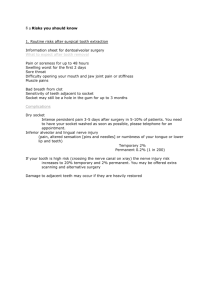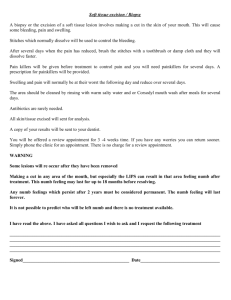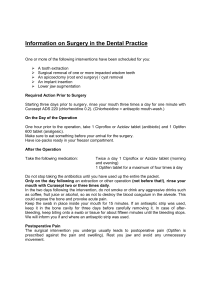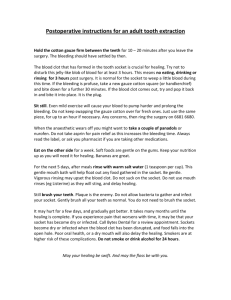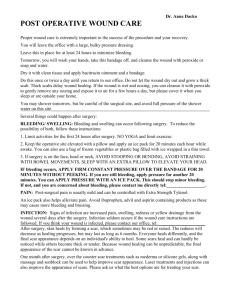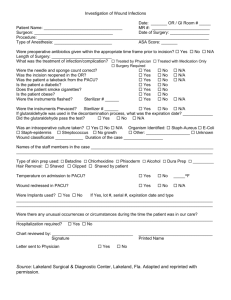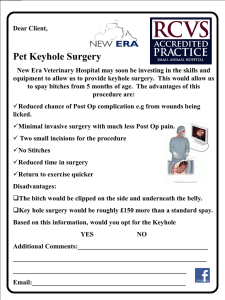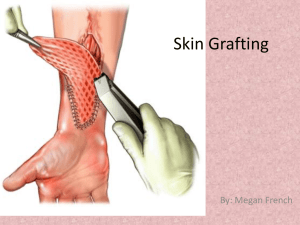Post operative care instructions after undergoing an oral surgery
advertisement
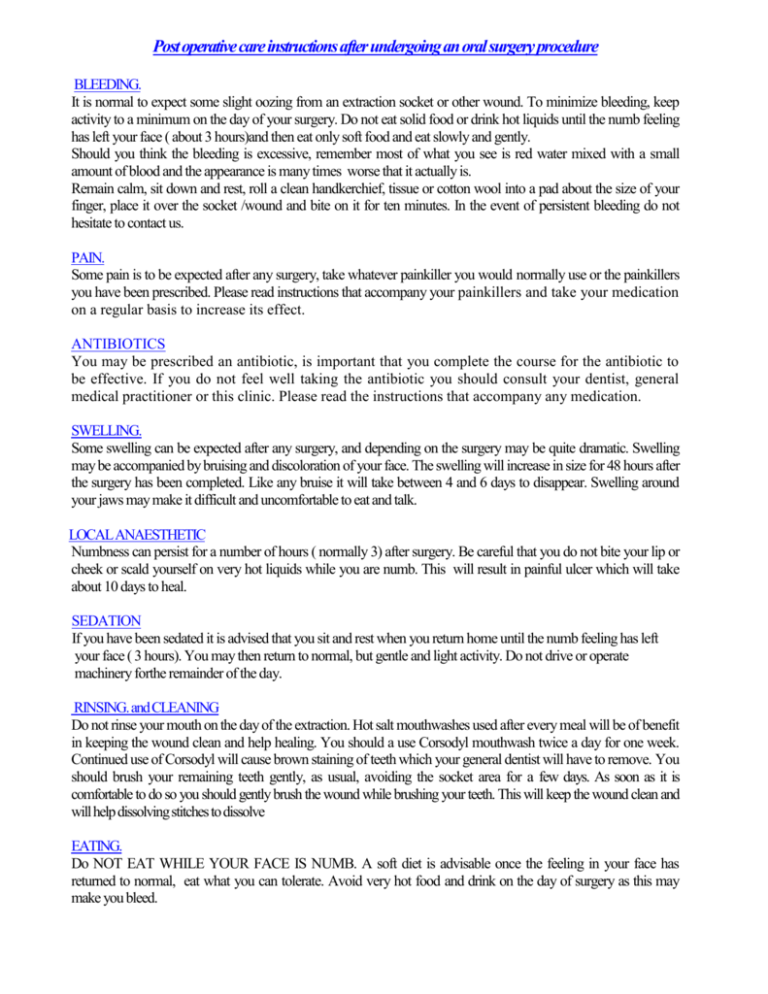
Post operative care instructions after undergoing an oral surgery procedure BLEEDING. It is normal to expect some slight oozing from an extraction socket or other wound. To minimize bleeding, keep activity to a minimum on the day of your surgery. Do not eat solid food or drink hot liquids until the numb feeling has left your face ( about 3 hours)and then eat only soft food and eat slowly and gently. Should you think the bleeding is excessive, remember most of what you see is red water mixed with a small amount of blood and the appearance is many times worse that it actually is. Remain calm, sit down and rest, roll a clean handkerchief, tissue or cotton wool into a pad about the size of your finger, place it over the socket /wound and bite on it for ten minutes. In the event of persistent bleeding do not hesitate to contact us. PAIN. Some pain is to be expected after any surgery, take whatever painkiller you would normally use or the painkillers you have been prescribed. Please read instructions that accompany your painkillers and take your medication on a regular basis to increase its effect. ANTIBIOTICS You may be prescribed an antibiotic, is important that you complete the course for the antibiotic to be effective. If you do not feel well taking the antibiotic you should consult your dentist, general medical practitioner or this clinic. Please read the instructions that accompany any medication. SWELLING. Some swelling can be expected after any surgery, and depending on the surgery may be quite dramatic. Swelling may be accompanied by bruising and discoloration of your face. The swelling will increase in size for 48 hours after the surgery has been completed. Like any bruise it will take between 4 and 6 days to disappear. Swelling around your jaws may make it difficult and uncomfortable to eat and talk. LOCAL ANAESTHETIC Numbness can persist for a number of hours ( normally 3) after surgery. Be careful that you do not bite your lip or cheek or scald yourself on very hot liquids while you are numb. This will result in painful ulcer which will take about 10 days to heal. SEDATION If you have been sedated it is advised that you sit and rest when you return home until the numb feeling has left your face ( 3 hours). You may then return to normal, but gentle and light activity. Do not drive or operate machinery forthe remainder of the day. RINSING. and CLEANING Do not rinse your mouth on the day of the extraction. Hot salt mouthwashes used after every meal will be of benefit in keeping the wound clean and help healing. You should a use Corsodyl mouthwash twice a day for one week. Continued use of Corsodyl will cause brown staining of teeth which your general dentist will have to remove. You should brush your remaining teeth gently, as usual, avoiding the socket area for a few days. As soon as it is comfortable to do so you should gently brush the wound while brushing your teeth. This will keep the wound clean and will help dissolving stitches to dissolve EATING. Do NOT EAT WHILE YOUR FACE IS NUMB. A soft diet is advisable once the feeling in your face has returned to normal, eat what you can tolerate. Avoid very hot food and drink on the day of surgery as this may make you bleed. SMOKING. Smoking delays all wound healing and makes postoperative infections are much more common. Avoid smoking on the day of surgery and for 4days after if possible. ALCOHOL. Alcohol is best avoided on the day of surgery as it may encourage bleeding. Do NOT drink alcohol after sedation. Dry socket A dry socket is a recognised complication following any dental extraction. It occurs after approximately 4% of all dental extractions. A dry socket is more common after having teeth extracted on the lower jaw, after difficult extractions, after having wisdom teeth removed, in females and in patients taking the oral contraceptive. The cause is unknown, but it is believed to be a failure to heal related to an inadequate blood clot forming in the socket initially or premature loss of the blood clot. The symptoms vary from mild to intense pain which may come on immediately after the dental extraction or approximately 3 days later and last between 10 and 14 days. On rare occasions the symptoms may last much longer. The pain is poorly or not relieved by painkillers, is constant and may keep you awake at night. Antibiotics will make no difference. Painkillers are generally ineffective and there is no effective treatment which a dentist can offer. It is best not to disturb the socket in the search for a cure as this can aggravate the condition. Some dentist will place dressings in the socket in the hope of relieving the pain. This is effective in a small minority of patients but also delays healing and may prolong the length of time with which you will suffer pain. The only effective treatment is to keep the wound as clean as possible with either hot salty mouth washes and Corsodyl mouth wash, to optimize conditions for healing and let nature take its course, the condition will then resolve naturally with no long term consequences. Numbness A numb feeling in your lip, chin, cheek or tongue is a recognised risk of surgery in your lower jaw. One patient in every two hundred patients will experience some altered sensation or numb feeling after the removal of wisdom teeth. This is usually short lived and full feeling will usually return in 3 to 6 months. It can on rare occasions take up to 18 months to recover and it is possible, but quiet rare for the numb feeling to last for ever. There is no effective treatment for this numb feeling.
